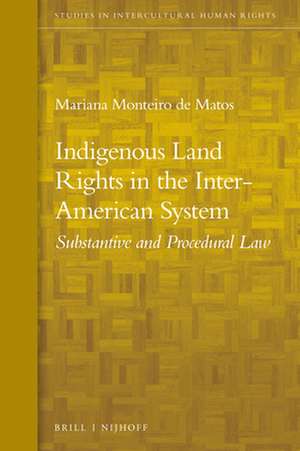Indigenous Land Rights in the Inter-American System: Substantive and Procedural Law: Studies in Intercultural Human Rights, cartea 10
Autor Mariana Monteiro de Matosen Limba Engleză Hardback – 7 oct 2020
In this book, Mariana Monteiro de Matos analyzes, in detailed and comprehensive inquiry, the pertinent jurisprudence of the Inter-American Commission and Court of Human Rights. She identifies three distinct waves of decision regarding the objects of ownership or possession, the rights associated, and the holders of the rights. Originally, the book also offers a profound analysis of corollary procedural law.
Preț: 729.08 lei
Preț vechi: 889.12 lei
-18% Nou
Puncte Express: 1094
Preț estimativ în valută:
139.51€ • 152.02$ • 117.56£
139.51€ • 152.02$ • 117.56£
Carte indisponibilă temporar
Doresc să fiu notificat când acest titlu va fi disponibil:
Se trimite...
Preluare comenzi: 021 569.72.76
Specificații
ISBN-13: 9789004411258
ISBN-10: 9004411259
Dimensiuni: 155 x 235 mm
Greutate: 0 kg
Editura: Brill
Colecția Brill | Nijhoff
Seria Studies in Intercultural Human Rights
ISBN-10: 9004411259
Dimensiuni: 155 x 235 mm
Greutate: 0 kg
Editura: Brill
Colecția Brill | Nijhoff
Seria Studies in Intercultural Human Rights
Cuprins
Foreword
Preface and Acknowledgements
Abbreviations of Institutions
Abbreviations of Legal Instruments
List of Illustrations
1 Introduction
1 Subject Matter: Polyversity and Indigenous Peoples
2 Research Objective and Questions
3 Preliminary Matters: on the Concept of Indigenous Peoples
4 Structure of the Book
Cases and Reports
References
2 General Background of the Inter-American System
1 Overview: the IAHRS and the ADHR
2 Key Legal Instruments and Indigenous Land Rights
3 IAHRS Main Organs and Their Procedures
Cases and Reports
References
3 First Wave: Individual Indigenous Persons as Holders of Land Rights, 2001–2006
1 An Important Precedent: the Aloeboetoe Case, 1993
2 The Beginning of Communal Indigenous Property
2.1 Awas Tingni Case, 2001
2.2Case Analysis
2.3Preliminary Assessment
3 Afterawastingni.com
3.1 Moiwana Case, 2005
3.2 Yakye Axa Case, 2005
3.3 Sawhoyamaxa Case, 2006
4 Interim Conclusions: Protecting Indigenous Property through Individuals
Cases and Reports
References
4 Second Wave: Transition toward Indigenous Peoples as Holders of Land Rights, 2007–2011
1 Between Individual and Collective Subjects of Rights
1.1 Saramaka Case, 2007
1.2Case Analysis
1.3Preliminary Assessment
2 Toward Collective Legal Subjects: Xákmok Kásek Case, 2010
2.1Justifying the Collective Legal Capacity of Tribal and Indigenous Peoples?
2.2Advancing the Recognition of the Collective Legal Capacity of Tribal and Indigenous Peoples: the ADRIP
3 Interim Conclusions
1.1Summary of Chapter 4 and Its Relationship with Chapter 3
1.2The Inter-American Backdoor Approach
1.3An International Faux Pas: the Requirement of Individualization of Groups
Cases and Reports
References
5 Third Wave: Indigenous Peoples as Holders of Land Rights, 2012–2019
1 Recognizing Collective Rights Holders
1.1 Kichwa of Sarayaku Case, 2012
1.2Case Analysis
2 Afterkichwaofsarayaku.com
2.1 Afro-Descendant Communities Displaced from the Cacarica River Basin Case, 2013
2.2 Kuna and Emberá Case, 2014
2.3 Garífuna of Punta Piedra Case, 2015
2.4 Garífuna of Triunfo de la Cruz Case, 2015
2.5 Kaliña and Lokono Case, 2015
2.6 Xucuru Case, 2018
3 Interim Conclusions
3.1Summary of Chapter 5 and Its Relationship with the Chapters 3–4
3.2General Effect of the Third Wave on the Inter-American System
3.3Contribution to International Human Rights Law: Procedural Corollaries
Cases and Reports
References
6 Conclusion
Cases and Reports
References
7 Summaries
1 Portuguese Summary: Resumo em Português
2 Spanish Summary: Resumen en Español
3 German Summary: Deutsche Zusammenfassung
Table of International Legal Instruments
Table of Inter-American Legal Instruments
Table of Cases and Reports
References
Index
Preface and Acknowledgements
Abbreviations of Institutions
Abbreviations of Legal Instruments
List of Illustrations
1 Introduction
1 Subject Matter: Polyversity and Indigenous Peoples
2 Research Objective and Questions
3 Preliminary Matters: on the Concept of Indigenous Peoples
4 Structure of the Book
Cases and Reports
References
2 General Background of the Inter-American System
1 Overview: the IAHRS and the ADHR
2 Key Legal Instruments and Indigenous Land Rights
3 IAHRS Main Organs and Their Procedures
Cases and Reports
References
3 First Wave: Individual Indigenous Persons as Holders of Land Rights, 2001–2006
1 An Important Precedent: the Aloeboetoe Case, 1993
2 The Beginning of Communal Indigenous Property
2.1 Awas Tingni Case, 2001
2.2Case Analysis
2.3Preliminary Assessment
3 Afterawastingni.com
3.1 Moiwana Case, 2005
3.2 Yakye Axa Case, 2005
3.3 Sawhoyamaxa Case, 2006
4 Interim Conclusions: Protecting Indigenous Property through Individuals
Cases and Reports
References
4 Second Wave: Transition toward Indigenous Peoples as Holders of Land Rights, 2007–2011
1 Between Individual and Collective Subjects of Rights
1.1 Saramaka Case, 2007
1.2Case Analysis
1.3Preliminary Assessment
2 Toward Collective Legal Subjects: Xákmok Kásek Case, 2010
2.1Justifying the Collective Legal Capacity of Tribal and Indigenous Peoples?
2.2Advancing the Recognition of the Collective Legal Capacity of Tribal and Indigenous Peoples: the ADRIP
3 Interim Conclusions
1.1Summary of Chapter 4 and Its Relationship with Chapter 3
1.2The Inter-American Backdoor Approach
1.3An International Faux Pas: the Requirement of Individualization of Groups
Cases and Reports
References
5 Third Wave: Indigenous Peoples as Holders of Land Rights, 2012–2019
1 Recognizing Collective Rights Holders
1.1 Kichwa of Sarayaku Case, 2012
1.2Case Analysis
2 Afterkichwaofsarayaku.com
2.1 Afro-Descendant Communities Displaced from the Cacarica River Basin Case, 2013
2.2 Kuna and Emberá Case, 2014
2.3 Garífuna of Punta Piedra Case, 2015
2.4 Garífuna of Triunfo de la Cruz Case, 2015
2.5 Kaliña and Lokono Case, 2015
2.6 Xucuru Case, 2018
3 Interim Conclusions
3.1Summary of Chapter 5 and Its Relationship with the Chapters 3–4
3.2General Effect of the Third Wave on the Inter-American System
3.3Contribution to International Human Rights Law: Procedural Corollaries
Cases and Reports
References
6 Conclusion
Cases and Reports
References
7 Summaries
1 Portuguese Summary: Resumo em Português
2 Spanish Summary: Resumen en Español
3 German Summary: Deutsche Zusammenfassung
Table of International Legal Instruments
Table of Inter-American Legal Instruments
Table of Cases and Reports
References
Index
Notă biografică
Dr. iur. Mariana Monteiro de Matos, LL.M., Max Planck Institute for Social Anthropology (Halle, Germany), is a postdoc fellow at the Law & Anthropology Department. She is a Brazilian lawyer and received her Ph.D. from the University of Göttingen.









